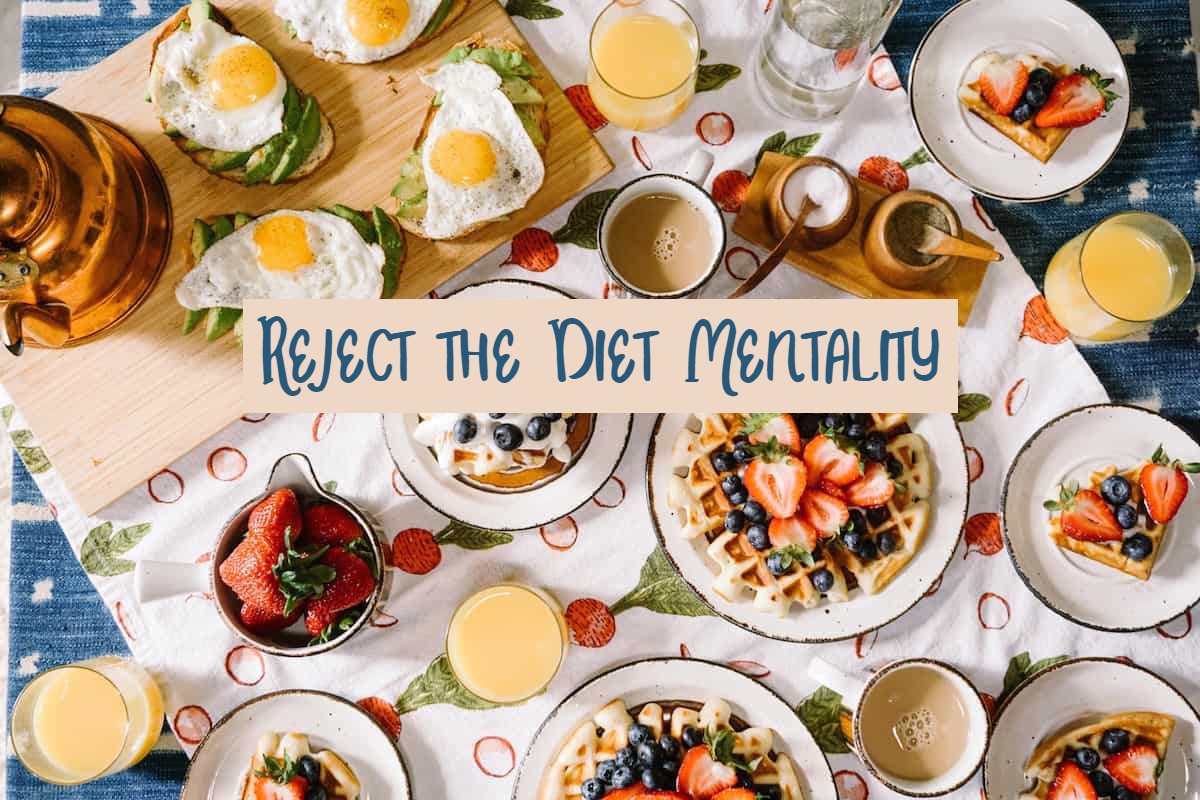Intuitive Eating – Part 1: Reject the Diet Mentality
As discussed in our previous blog, Tribole and Resch, authors of, Intuitive Eating: A Revolutionary Program That Works, speaks of intuitive eating and the dangers diet culture can have on an individual’s relationship with food and thus mental health. This post will discuss rejecting the diet mentality to begin your journey towards intuitive eating!
Ditching the Diet Mentality
Rejecting the diet mentality in a society fixated on “diet culture” can be extremely challenging as social media, television, radio stations, magazines, billboards, etc., not only preach but push the newest fad diet. This makes intuitive eating not so “intuitive”! We are praised when we restrict our diets because that is looked upon as having “true will power and strength”. We are praised when we lose weight. But what happens when we stop losing weight or (heaven forbid) gain weight? The positive reinforcement stops. The mental battle of “what am I doing wrong?” sets in. Thus, “I must try something new and different”, “restrict harder”, or “exercise more.” Side note: Americans spend over $60 billion annually to lose weight. If that tells you anything it should be that diets do not work for long-term weight loss. If it did, we probably would not be trying the newest diet every year. Reject the diet mentality!
Instead of questioning why you are not losing weight and/or sustaining weight loss, question the diet. I have found one thing in common with almost every diet that states “it works”, and that is restriction. If you honestly think about it and think of every diet out there that states “health” at its core, we are left with almost nothing. We cannot eat carbohydrates, fats, certain proteins, sugar, processed foods, gluten, dairy, soy, starchy vegetables, certain fruits, fruit juice, whole eggs, foods with more than “x amount of calories”, foods with more than “x amount of ingredients”, foods with ingredients you cannot pronounce, food after a certain time of day, etc.,. So of course, we are spending over $60 billion annually on weight loss. That is a lot of mixed messages! Yes, people do not restrict all of these food groups or items at the same time, but how do these diets affect our views and relationship with food? It leaves you wondering what can I eat? If every diet is telling you a certain food is not healthy, then what is healthy? In addition, I like to challenge my clients to determine and define what “healthy” means to them. The majority of diets focus on weight and body shape as the definition of health.
Health is more than the number on the scale or the size of your jeans. Health embodies the body, mind, and spirit. Health means enjoying all foods because you are worthy of enjoying all foods. Health means exercising because it makes you feel good. Health means taking time for you. Health means eating a cheeseburger because it sounds good. Health means eating a salad because it sounds good. Health means connecting with others.
When you stop fixating on food, body size, what you can eat, what you cannot eat, you allow food to be what it is and that is food! If dieting was not a “thing” than intuitive eating would just be eating. Intuitive eating focuses on being mindful of what your body wants and honoring it. You can start your journey towards intuitive eating by rejecting the diet mentality.
Disclaimer:
If you are struggling with an eating disorder or in early recovery of an eating disorder, mindful eating may not be appropriate as hunger and fullness cues can be diminished or absent. Before starting intuitive eating, talk with your dietitian first! A dietitian can help guide you towards a healthy body, mind, and spirit by working with you to challenge eating disorder beliefs and help you reconnect to the joy of eating!
Resources:
1TRIBOLE, E. V. E. L. Y. N., & Resch, E. (2020). Intuitive Eating: a revolutionary program that works. S.l.: ST MARTINS ESSENTIALS.



